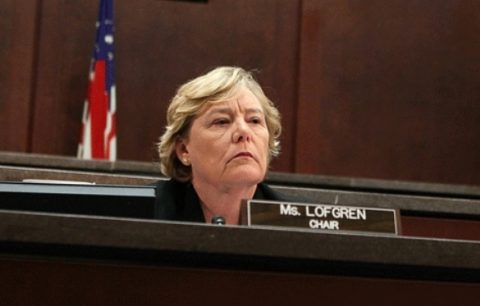Interior Enforcement

Congresswoman Zoe Lofgren Demands Investigation into ICE’s Secure Communities Program
Some would argue that ICE’s Secure Communities program has been fraught with problems ever since it launched in 2008—from concerns over the lack of federal oversight to questions regarding the criminality of immigrants targeted. But after months of back and forth over how and whether jurisdictions are able to opt-out of this immigration enforcement program (which shares the fingerprints of individuals booked into jails with federal databases), California Congresswoman Zoe Lofgren (D-CA) has had enough. This week, Rep. Lofgren called for an investigation into the actions of federal immigration officials whom she said lied about whether states and localities had the right to opt-out of the program. Read More

Secure Communities Program Continues to Take Heat for Targeting Non-Criminals
At a conference last week, DHS Secretary Janet Napolitano raised a few eyebrows when she implied those who are fingerprinted through ICE’s Secure Communities program are presumably guilty of a crime—a particular sticking point considering the program’s reputation for sweeping up non-criminals. Although ICE officials claim the program targets criminal aliens, nearly 28% of people deported through the Secure Communities program are actually non-criminals. But that’s just one of the many problems immigrant advocate and community groups are voicing over this rapidly expanding program. Read More

New “E-Verify Self Check” Pilot Program is Not a Cure-All
BY TYLER MORAN, NATIONAL IMMIGRATION LAW CENTER E-Verify has a problem: Washington politicians want to force American employers to use the electronic employment verification system, but the system is still not ready for prime time. On Monday, the Department of Homeland Security (DHS) took a step toward remedying the database error rates by announcing E-Verify “Self Check.” This pilot program will allow people in select states and the District of Columbia to go online and verify their identity and authorization to work in this country—and to fix any errors before applying for a job with an employer who uses E-Verify. While a positive step, the pilot program is only one piece of the puzzle in fixing E-Verify and will likely be inaccessible to many—including the low-income workers who most need it. Read More

Police Forum Recommends Limitations on Investigating Immigration Status
The role of local police in immigration enforcement continues to be a complex policy and legislative issue at both the state and federal level. State legislatures, for example, are contemplating bills designed to increase the role of local police in immigration enforcement while federal legislation targets cities with so-called “sanctuary policies.” And as programs like 287(g), Secure Communities and other federal/local partnerships continue to expand, local police are now more involved in identifying undocumented immigrants than ever before. Many law enforcement officers, however, find that enforcing federal immigration law may interfere with their ability to prevent crime and keep neighborhoods safe, so they have designed tailored local policies to ensure that they maintain the best possible relationship with their communities. In a new report by the Police Executive Research Forum (PERF), local police speak out on the difficulties of enforcing immigration laws and talk about best practices for navigating immigration issues in the future. Read More

New DHS Documents Highlight Internal Confusion Over Secure Communities Program
Since the Secure Communities program was announced in 2008, immigrant advocates have consistently asked whether the program is voluntary or mandatory. ICE’s response to the question has changed many times over the years. While ICE has said that the agency will eventually install Secure Communities in all state and local detention facilities nationwide (which makes it seem like a federal mandate), they have also indicated that the program is voluntary. After repeated questions about whether or not localities could opt-out of the program, ICE gave increasingly confusing and conflicting responses. This month, new documents recently released by DHS in response to a Freedom of Information Act (FOIA) only further highlight the internal confusion and shifting definition of the voluntary or mandatory nature of the Secure Communities program. Read More

Mandatory E-Verify is Not All It’s Cracked Up to Be
Today, the House Immigration Subcommittee held a hearing on the E-Verify system, a tool to help employers electronically verify that their employees have permission to work in the United States. Although E-Verify remains largely voluntary—except for federal contractors, employers in certain states that have made it mandatory, and a few other exceptions—some members of Congress and immigration restrictionists have decided that expanding E-Verify and making it mandatory will flush unauthorized workers out of the workforce, create jobs for unemployed U.S. citizens, and resolve our immigration problems. While everyone agrees that high unemployment levels must be addressed, simplistic measures like mandating E-Verify are not going to open up jobs for millions of unemployed workers. Read More

Study Shows 287(g) Program Fails to Prioritize Serious Criminals
This week the Migration Policy Institute released a new study on ICE’s 287(g) program, Delegation and Divergence: A Study of 287(g) State and Local Immigration Enforcement. The study, which assesses the implementation, enforcement outcomes, costs, community impacts of the program generally, and provides an in-depth study in seven jurisdictions: Cobb County, GA; Frederick County, MD; Gwinnett County, GA; Los Angeles County, CA; Prince William County, VA; Las Vegas, NV; and the state of Colorado, found that 287(g) program is not living up to its promise. In fact, the study finds that ICE’s allows jurisdictions to “operate the 287(g) program in fundamentally different ways across the country.” Read More

How Expanding E-Verify Hurts the Economy and American Workers
By Tyler Moran, National Immigration law Center. The Government Accountability Office (GAO) recently released a report, Employment Verification: Federal Agencies Have Taken Steps to Improve E-Verify, but Significant Challenges Remain. GAO’s verdict on E-Verify (a program to verify the employment eligibility of new hires) is in: this program is not yet ready for prime time. According to GAO, risks posed by mandatory E-Verify range from encouraging employers to skirt the rules to job losses for native born and immigrant work-authorized people alike. Policymakers who want to roll out this flawed program as quickly as possible should heed the report’s warning that “significant challenges remain” with E-Verify. Read More

Win, Lose or….Draw? The Supreme Court Tackles Arizona’s Employer Sanctions Law
Those following the Obama Administration’s legal challenge to Arizona’s SB 1070 have likely heard about “preemption”—the legal concept governing when state laws conflict with, and are therefore superseded by, acts of Congress. The heart of the dispute over SB 1070 is whether states have a right to provide assistance that the federal government does not want. No one knows if or how the Supreme Court will ultimately answer that question. But a number of hints may emerge when the Justices issue a ruling in Chamber of Commerce v. Whiting, a case testing the legality of a different law known as the Legal Arizona Workers Act. Passed in 2007, the act imposed new requirements to prevent employers from hiring unauthorized workers, as well as harsh consequences for doing so. While the Justices’ questions during Wednesday’s oral argument offered reason for hope among immigrants’ rights advocates on one part of the law, they left the fate of the other unresolved. Read More

Sanctuary Cities and the State Criminal Alien Assistance Program: Two Things that Do Not Go Together
The Center for Immigration Studies recently released a report entitled Subsidizing Sanctuaries: The State Criminal Alien Assistance Program, which claims the federal government is giving State Criminal Alien Assistance Program (SCAAP) grant money to “sanctuary” cities. The problem with this argument is that the very fact these cities (San Francisco, Chicago, Arlington, VA) are receiving SCAAP money means that they are not providing sanctuary to immigrants. SCAAP money goes to localities to reimburse them for the costs of jailing immigrants. Read More
Make a contribution
Make a direct impact on the lives of immigrants.
